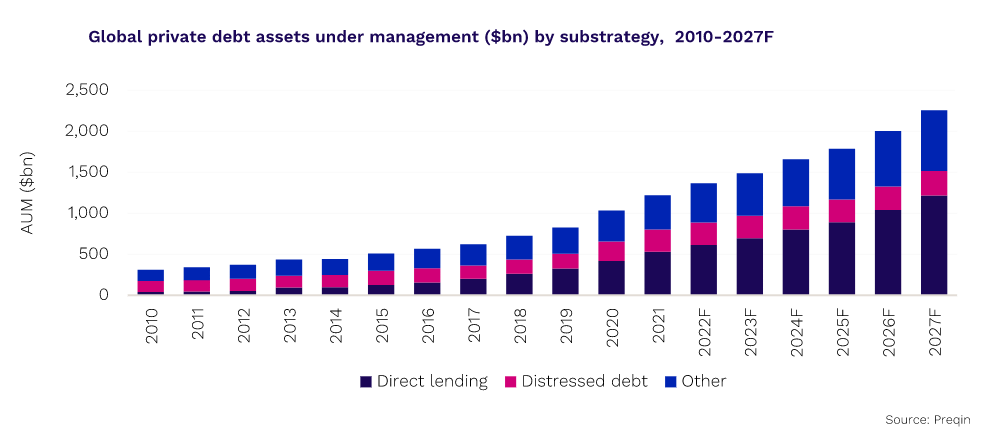Private Debt in many cases is still a vastly unexplored asset class due to its opaque nature, yet increasingly over time with the changing economic backdrop there’s been a surge in interest and growth over the past few years by investors on the search for additional yield.
Private Debt in many cases is still a vastly unexplored asset class due to its opaque nature, yet increasingly over time with the changing economic backdrop there’s been a surge in interest and growth over the past few years by investors on the search for additional yield.
As researched by Preqin, private debt is ‘forecasted to grow at a compounded annual growth rate (“CAGR”) of 10.8% between 2021 and 2027 to reach an all-time high of $2.3tn in 2027’, compared to the other asset classes in alternatives, private debt is gaining reputable traction, let us tell you why.

Most Australian companies are private, which means they are unrated and therefore unable to access finance through the bond market (public markets). The Australian bond market isn’t very diversified and unable to finance the Australian economy, therefore being heavily reliant on banks for funding. Compared to our peers in the U.S. and Europe, Australia’s bond market predominately consists of large mega-cap companies listed on the stock exchange, or offshore governments issuing in parcels predominantly of minimum a A$100 million.
Since the GFC of 2008, which was the result of cheap credit and lax lending standards, burdening financial systems globally. Not to recreate the universal financial bloodbath of ‘too big to fail’, accentuating a failure of the banks could lead to a collapse of the economy, with governments handing bailouts at taxpayers’ dismay. ‘Too big to fail’, prompted changes to banks’ balance sheets requiring Australian depository institutions (“ADI”) to hold more capital against their assets known as capital adequacy ratio, ‘Basel 3’, decreasing a banks risk portfolio and improving their ability to handle any shocks from financial stress.
Fast forward to 2019 in Australia, the entanglement of the Royal Commission – an inquiry into the misconduct in the Banking, Superannuation and Financial Services Industry, calling the industry to improve in four different areas, one of which was the provision of credit to small to medium sized businesses.
Direct lenders, such as FC Capital are non-bank financial institutions servicing middle market companies, which by broad definition are typically looking to borrow between A$2m to A$100m. Australian companies have the need for funding to either finance growth, expand working capital, or fund real estate development. It’s been increasingly hard for banks to finance middle market companies, due to their balance sheet constraints, therefore an alternate need for debt financing is required.
Since FC Capital’s inception in 2012, we pride ourselves as the ‘pioneers in private debt and direct lending’. Due diligence undeniably is our main strength and key differentiator amongst other private lending peers through ‘our experienced in-house investment team and rigorous due diligence process supported by a panel of trusted external legal, tax and technical advisors’.
Our investment approach seeks to preserve capital and maximise returns to investors, achieved through a holistic evaluation of all transactions - assessing borrowers and originating transaction opportunities directly with borrowers, recognising drivers of cashflow and imposing covenant controls.
Our team have a strong culture focusing on risk management and delivering returns for our investors. With the banks retreating from the middle market this has created a perfect opportunity for investors to gain access to private debt as an asset class that is attractive due to stability of capital as loans are senior secured, and an alternate source of income.
DISCLAIMER
This website provides general information only. It does not take into account the investment objectives, financial situation or particular needs of any person and should not be used as the basis for making investment, financial, taxation or other decisions, and you should consider its appropriateness with regard to these factors before acting on it. The issuers of the products within this website can be found in the relevant disclosure document. Read the disclosure documents for your selected product before deciding. Any taxation information described is a general statement and should only be used as a guide. Before making an investment decision, you should seek independent financial or taxation advice and consider whether an investment is appropriate in light of your particular investment needs, objectives and financial circumstances.
Speak To Our Team
Get in touch with our expert team today. Fill out a small form to help us better understand your requirements.
Contact Us